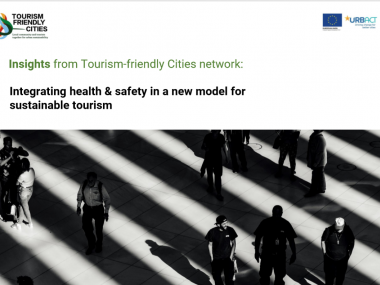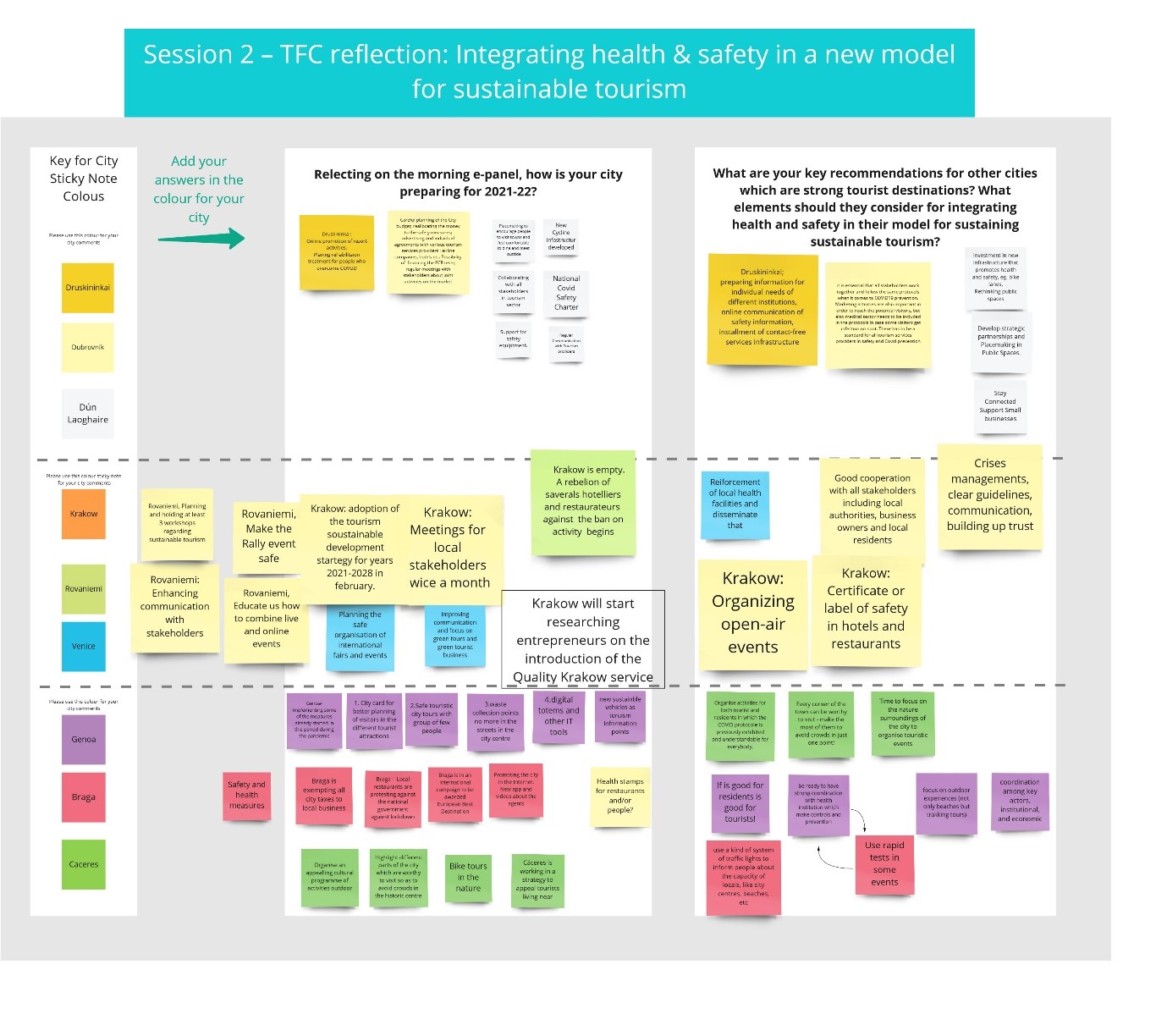Insights from Tourist-friendly Cities network: Integrating health & safety in a new model for sustainable tourism
Edited on
17 February 2021In the framework of the fifth transnational meeting that took place in January 28-29 2021, the Tourism-friendly Cities (TFC) URBACT network focused at one key element for consolidating sustainable tourism practices: the health and safety of tourists, and, of course, of residents. As the TFC cities are beginning to develop their Integrated Development Plans (IAPs) on sustainable tourism, in a co-creation process within their own URBACT Local Groups (ULG), we wanted to reflect at this theme that was not so visible on our radar in 2019 when we imagined the initial peer-to-peer learning and exchange workplan of the network.

For this, we asked top policy-makers and city practioners to join us in an online introductory thematic panel discussion on Thursday January 28th 2021. This live streaming session (full recording available here) was afterwards followed by a workshop where TFC cities representatives further exchanged on how their communities are actively adapting measures to integrate health and safety in their tourism practices and their effect on industry, residents and the city since the outbreak of the pandemic. Below are some key takeaways that summarize main actions and emerging trends on what we are learning in real time from the COVID-19 pandemic.
If it’s good for residents, it’s good for tourists: Key takeaways from the live streaming discussion
Laura Gaggero- the Deputy Mayor for City Marketing and Tourism, Genoa Municipality, Italy- offered concrete examples on how Genoa Municipality is working together with key tourism stakeholders for making sure that at local level safety and health protocols can be implemented in order to open the city for a new touristic season. Examples included the work conducted together with the cruise companies and port authority in order to preserve cruise safety bubbles when conducting city centre guided tours and the development of local tourism packages that promote and integrate services from neighbourhood businesses. Most importantly, it offered a concrete viewpoint on how important is for city leaders to be committed to finding solutions and acknowledging that these solutions can only be developed in partnership with key stakeholders.
Dr. Miia Palo, Chief Medical Officer, Lapland hospital district, Rovanimeni, Finland- explained the work they conducted as medical professionals to collaborate and be available for local entrepreneurs, especially tourism businesses, to understand how they can follow health and safety guidance. The visible part of this work is accessible within this platform, which contains updated information for both tourists and tourism businesses about COVID-19 safety procedures in Rovaniemi area. The invisible part of this work was the understanding that trust is a precious and essential element that needs to be preserved for any collective response and that building networks, supporting effective communication and availability for finding solutions together is crucial for that. Most significantly, was the underlying understanding that it is not a fight between medical VS economical mindsets, but rather a common one: without businesses, livelihood and wellbeing of residents will be impacted, without health and safety measures, livelihood and wellbeing of residents and tourists will suffer.
Jane Stacey - Head of Tourism Unit, Centre for Entrepreneurship, SMEs. Regions and Cities, OECD- highlighted that the crisis caused by the COVID-19 pandemic has shown how important tourism is at local level and how much it is missed when it is gone. This opens up a significant opportunity to address its current challenges (the risk or realities of overtourism) and build a better practice for tourism. In this context, businesses which can make a business case of sustainable and eco practices will probably have a strong possibility for growth. Moreover, careful consideration should be given to how to ensure the safety of the entire tourism ecosystem, as it is not enough to guarantee that only one service is safe. For this, stronger coordination between national, European and international entities is essential to order to ensure safe international mobility.
Andrea Verdiani, Head of Commercial Office - Marine Stations S.p.A, Genoa, Italy and Nur El Gawohary, Press and External Officer, Airport of Genoa, Italy- offered the local perspective of two of the most important tourism mobility entities in Genoa- the port authority and the airport. For both entities, safety protocols have become the norm long before the current pandemic, and this is why their current work is on how the added health protocols can became part of the current norm. Due to the strong commitment to safety, the port authority has managed to already open operations for tourist cruises, while the airport is working closely with airlines to involve them also in communication with tourists on new norms and protocols and how to enjoy Genoa as a safe destination.
Balancing action with caution: Key takeaways from the TFC cities workshop
TFC cities are constantly adapting to the situation caused by the COVID-19 pandemic and are making significant changes for their 2021/2022 season:
Visual summary of workshop discussion where TFC cities representatives exchanged on how their communities are actively adapting measures to integrate health and safety in their tourism practices and their effect on industry, residents and the city since the outbreak of the pandemic.
1. Adjusting local budgets to support local tourism businesses and local entrepreneurs. Several cities, such as Dubrovnik and Dún Laoghaire, are planning to allocate municipal funds in order to support local and small and medium business comply with the new safety protocols. Braga is exempting local businesses from all city taxes for 2021, while Dubrovnik is also taking into consideration financing PCR tests.
2. Valuing local assets and their effects on residents and visitors health and wellbeing. Druskininkai, as a spa resort city, is currently planning rehabilitation treatment packages for people who overcame COVID-19. Dún Laoghaire has recently completed one of its capital infrastructure projects, the new cycle route, which now enables a safe and active mobility option for both residents and visitors to enjoy the centre and surrounding areas.
3. Focus on online promotion of their attractions and their city as a destination. Genoa is promoting the city card for better planning of tourist flows, while Braga has launched a new app and video on local agents and is currently in the international competition for best European tourist destination for 2021 (LE: Braga just won the first place in this competition).
4. Hosting regular meetings and coordination communication with tourism stakeholders. Krakow is hosting a monthly meeting and has been transferring some takeaways in its new development plan for Krakow 2021- 2028 (to be approved in February). Rovaniemi is organizing dedicated workshops on how to sustain sustainable tourism practices, while Dubrovnik and Venice are advocating for tourist stakeholders to develop joint activities to be offered on the market and a focus on green tourism and green tourism businesses, respectively.
5. Focus on outdoor activities and placemaking events. Dún Laoghaire (DLR) is working on supporting placemaking activities in order to encourage people to visit the DLR area and feel safe to dine and meet outside. Genoa is promoting safe touristic city tours with groups of few people, and has taken the waste collection points out of the city center streets, while Caceres organizes regular bike tours and is aiming to adapt most of its cultural programming for the season to outdoor activities.
6. Proactively thinking on the future of events. Rovaniemi is encouraging learning from all the tourism ecosystem on how to combine live and online events and Venice started planning how to organize safe international events and fairs. Caceres is focusing on how to encourage visitors to visit other parts of the city outside of the historical centre in order to avoid crowds.
7. A label for quality: Krakow will start research on the introduction of the Quality Krakow service, together with local entrepreneurs. The Quality Krakow service could become a label that can guarantee that health and safety protocols are respected at the highest standard.
8. Monitoring and understanding local concerns of tourism businesses. Both Braga and Krakow have experienced local protests from some local restaurants and hotels against national lockdown rules. The situation caused by the COVID-19 pandemic is and will continue to bring personal and financial loss, as well as different levels of understanding and support that can be granted at local, regional and national level. This is why, open communication channels at local level are crucial for building and maintaining trust and finding a collective answer to a collective challenge.
Article by Anamaria Vrabie, Lead Expert for the URBACT Tourism-friendly cities Network
Submitted by Sabrina Bruzzone on
